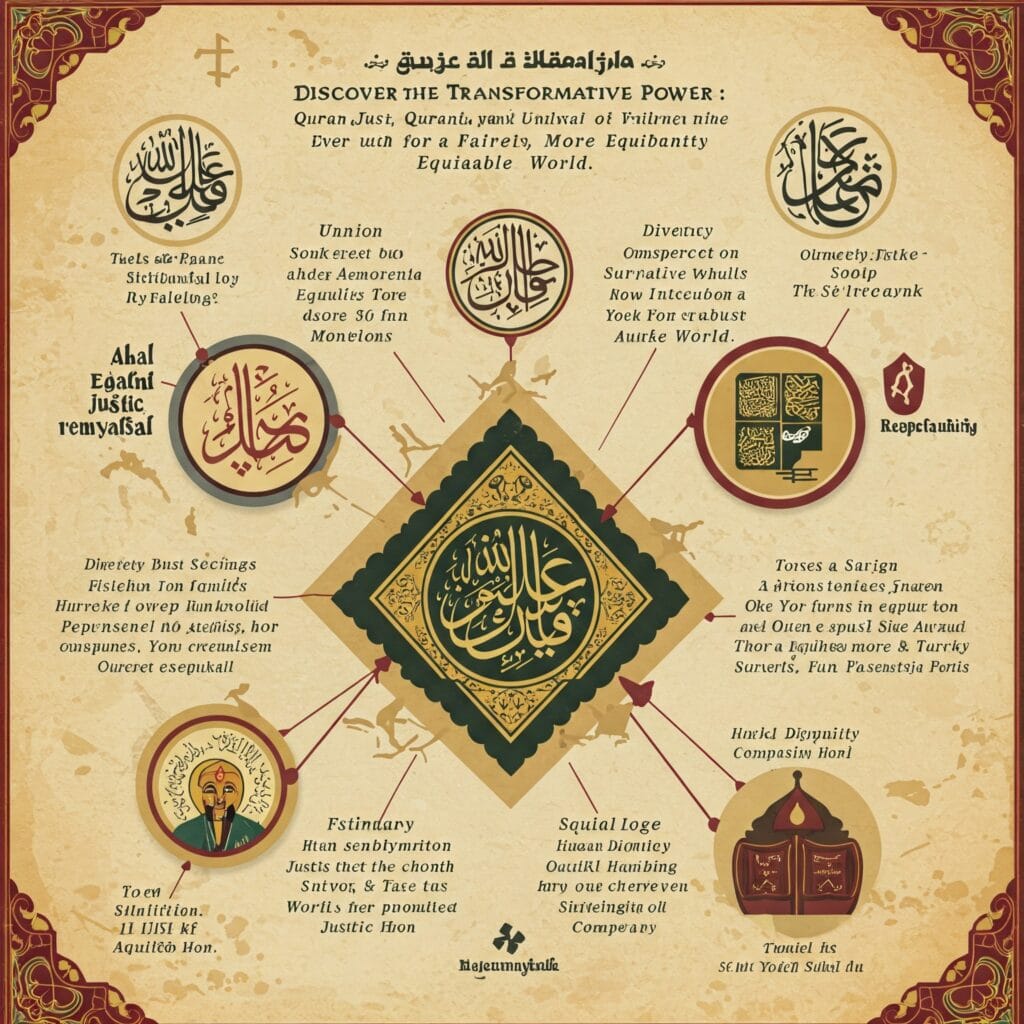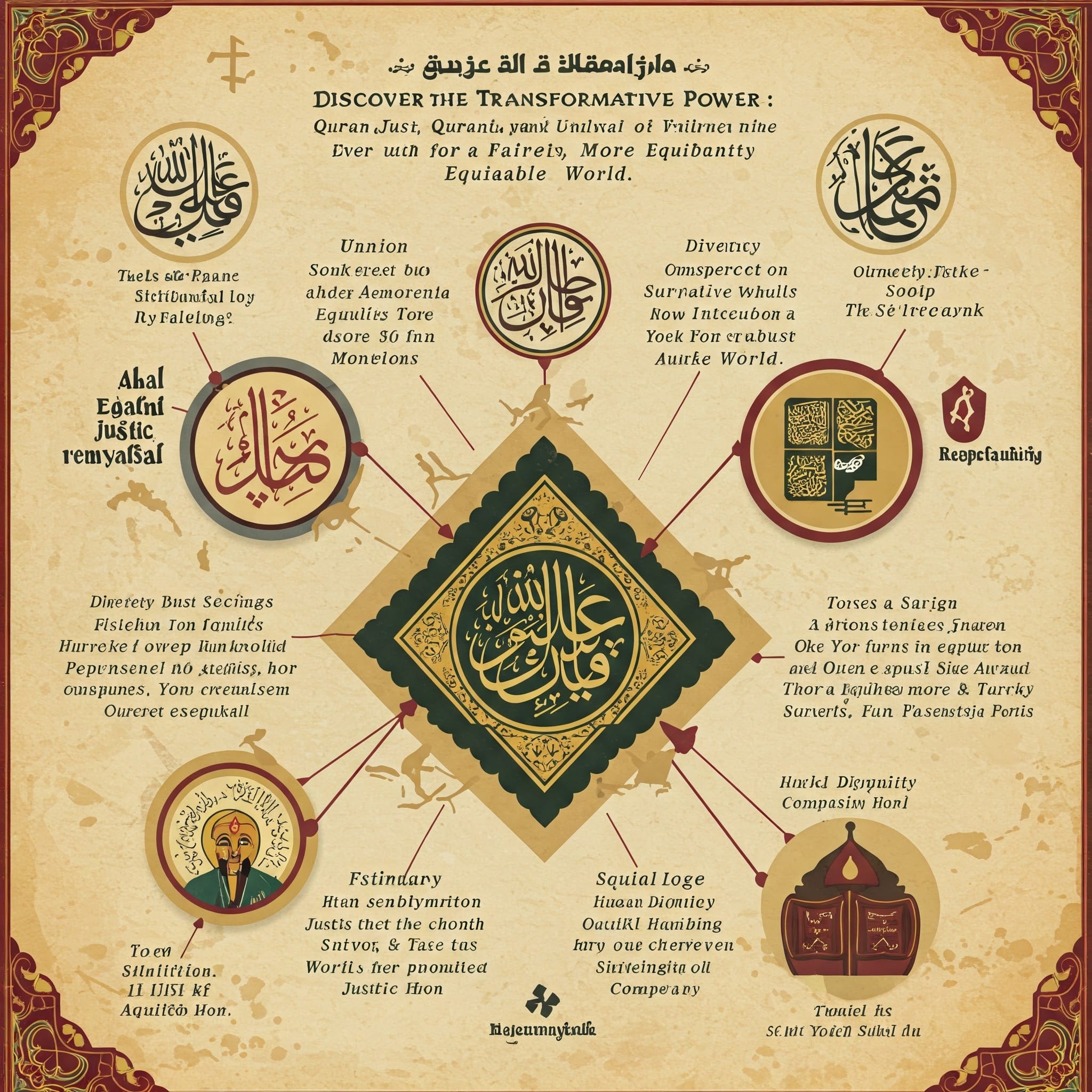Justice and social equity are foundational principles in Islam, deeply rooted in the Quran, the divine revelation received by the Prophet Muhammad (peace be upon him). As a universal guide for over 1.9 billion Muslims, the Quran provides timeless directives for establishing fairness, equality, and compassion in human interactions, governance, and societal structures. These principles transcend cultural and temporal boundaries, offering a framework for addressing contemporary challenges like economic disparity, gender inequity, and systemic oppression in 2025. This in-depth article explores the Quranic guidance on justice and social equity, examining key verses, prophetic applications, practical implications, and modern contexts. By analyzing theological foundations, addressing misconceptions, and highlighting global initiatives, we aim to illuminate how the Quran’s vision fosters a just and equitable world.

Theological Foundations of Justice and Social Equity
Quranic Mandate for Justice
The Quran emphasizes justice (`adl) as a divine command, integral to Allah’s purpose for humanity. A pivotal verse states:
“Indeed, Allah commands you to render trusts to whom they are due and when you judge between people to judge with justice…” [An-Nisa 4:58]
This verse underscores the obligation to uphold fairness in judgments, contracts, and social dealings, reflecting Allah’s attribute of Al-`Adl (The Just). Justice is not optional but a sacred duty, binding individuals and communities to act equitably.
Another key verse reinforces impartiality:
“O you who have believed, be persistently standing firm in justice, witnesses for Allah, even if it be against yourselves or parents and relatives…” [An-Nisa 4:135]
This directive prioritizes justice over personal or familial loyalties, ensuring fairness transcends bias, a principle critical in legal and social contexts.
Social Equity in the Quran
The Quran advocates for social equity (adalah ijtimaiyyah), promoting a society where resources, opportunities, and dignity are accessible to all. It condemns oppression and exploitation:
“And do not incline toward those who do wrong, lest you be touched by the Fire…” [Hud 11:113]
This verse warns against siding with oppressors, urging believers to champion the marginalized. The Quran also emphasizes economic equity:
“And those within whose wealth is a known right for the petitioner and the deprived…” [Al-Ma`arij 70:24-25]
This mandates sharing wealth with the needy, institutionalizing charity (zakat) and voluntary giving (sadaqah) to reduce disparities.
Spiritual Equality
The Quran establishes spiritual equality as the foundation for social equity:
“Indeed, the most noble of you in the sight of Allah is the most righteous of you…” [Al-Hujurat 49:13]
This verse negates hierarchies based on race, wealth, or status, affirming that taqwa (God-consciousness) is the sole criterion for superiority. It fosters inclusivity, challenging discriminatory practices.
Prophetic Implementation
The Prophet Muhammad (peace be upon him) exemplified Quranic justice and equity. His Sunnah provides practical applications:
- Judicial Fairness: He judged impartially, as seen when he ruled against a noblewoman from Banu Makhzum for theft, stating, “By Allah, if Fatimah, the daughter of Muhammad, stole, I would cut off her hand” [Sahih al-Bukhari 3475]. This reflects An-Nisa 4:135’s call for unbiased justice.
- Economic Equity: The Prophet established zakat and encouraged wealth distribution, saying, “He is not a believer whose stomach is filled while his neighbor goes hungry” [Sunan Ibn Majah 183]. This aligns with Al-Ma`arij 70:24-25.
- Social Inclusion: He uplifted marginalized groups, including women, slaves, and orphans. His appointment of Bilal, a former slave, as the first muezzin, embodied Al-Hujurat 49:13’s emphasis on equality.
Core Principles of Quranic Justice and Equity
1. Impartiality in Judgment
The Quran mandates fairness in legal and personal disputes, as per An-Nisa 4:58. This principle applies to courts, arbitration, and daily interactions, ensuring no one is favored due to wealth or status.
2. Protection of the Vulnerable
The Quran prioritizes the rights of orphans, widows, and the poor:
“And give the orphan their property, and do not substitute the defective [of your own] for the good [of theirs]…” [An-Nisa 4:2]
This safeguards vulnerable groups, promoting social welfare.
3. Economic Justice
Zakat, a mandatory 2.5% wealth tax, redistributes resources to the needy (At-Tawbah 9:60). The Quran also prohibits usury (riba) to prevent exploitation:
“But Allah has permitted trade and has forbidden interest…” [Al-Baqarah 2:275]
This fosters equitable economic systems.
4. Gender Equity
The Quran grants women rights to inheritance, property, and dignity:
“For men is a share of what the parents and close relatives leave, and for women is a share…” [An-Nisa 4:7]
This revolutionary provision in 7th-century Arabia empowered women economically and socially.
5. Racial and Ethnic Equality
Al-Hujurat 49:13 dismantles racial hierarchies, a principle reinforced by the Prophet’s Farewell Sermon: “No Arab has superiority over a non-Arab, nor a white over a black, except by piety.”
Practical Applications in Muslim Societies
Governance and Legal Systems
Islamic governance, rooted in the Quran, prioritizes justice. The concept of shura (consultation) in Ash-Shura 42:38 ensures inclusive decision-making. In 2025, countries like Malaysia and Qatar integrate Quranic principles into legal frameworks, with sharia courts emphasizing restorative justice for family and inheritance disputes.
Economic Redistribution
Zakat institutions, like Pakistan’s Bait-ul-Mal or Indonesia’s BAZNAS, collect and distribute funds to alleviate poverty, aligning with Al-Ma`arij 70:24-25. Microfinance initiatives inspired by Al-Baqarah 2:275 provide interest-free loans, empowering entrepreneurs in Bangladesh and Egypt.
Social Welfare
Quranic mandates inspire global Muslim charities, such as Islamic Relief, which supports orphans and refugees, fulfilling An-Nisa 4:2. Community kitchens in India and Turkey reflect the Prophet’s emphasis on feeding the hungry.
Gender and Minority Rights
In 2025, organizations like Musawah advocate for women’s Quranic rights in marriage and inheritance, countering cultural misinterpretations of An-Nisa 4:7. Interfaith councils in Bosnia and South Africa promote Al-Hujurat 49:13, fostering racial harmony.
Common Misconceptions and Clarifications
Misconception 1: Islamic Justice Is Punitive
Myth: Sharia is solely about harsh punishments, ignoring social equity. Clarification: The Quran prioritizes mercy and rehabilitation. Hudud punishments are rare, with strict conditions, while An-Nisa 4:58 emphasizes restorative justice. Scholars like Dr. Tariq Ramadan highlight Islam’s focus on compassion.
Misconception 2: Women Lack Equity in Islam
Myth: The Quran subordinates women, limiting their rights. Clarification: An-Nisa 4:7 grants women inheritance and property rights, revolutionary for its time. Cultural practices, not Quranic teachings, cause disparities, as addressed by Musawah’s advocacy.
Misconception 3: Zakat Is Optional Charity
Myth: Zakat is a voluntary act, not a systemic tool for equity. Clarification: At-Tawbah 9:60 mandates zakat as a pillar of Islam, designed to redistribute wealth structurally, not merely as charity.
Misconception 4: Islam Endorses Racial Hierarchy
Myth: Islamic societies inherently favor certain ethnicities. Clarification: Al-Hujurat 49:13 and the Prophet’s Farewell Sermon explicitly reject racial superiority, promoting universal equality.
Contemporary Contexts in 2025
Global Initiatives
- Economic Equity: The Islamic Development Bank funds sustainable projects in Africa, aligning with Al-Baqarah 2:275’s trade promotion. Apps like Zakatify streamline zakat distribution, enhancing transparency.
- Gender Justice: In Saudi Arabia, reforms expand women’s economic participation, reflecting An-Nisa 4:7. Tunisia’s family law reforms draw on Quranic gender equity.
- Social Inclusion: Canada’s Muslim-led refugee programs and South Africa’s interfaith dialogues embody Al-Hujurat 49:13, addressing global migration and racial tensions.
- Digital Advocacy: Platforms like IslamQA and SeekersGuidance clarify Quranic justice, countering extremism and cultural distortions.
Challenges
- Cultural Deviations: Patriarchal norms in some regions misinterpret An-Nisa 4:7, limiting women’s rights. Advocacy groups educate communities.
- Economic Disparities: Wealth concentration in Gulf states challenges Al-Ma`arij 70:24-25. Zakat reforms aim to bridge gaps.
- Systemic Racism: Despite Al-Hujurat 49:13, minority Muslims face discrimination in Western countries. Interfaith coalitions work to dismantle biases.
Practical Steps for Implementation
To align with Quranic justice and equity, individuals and communities can:
- Learn Quranic Principles: Study verses like An-Nisa 4:58 via Al-Maghrib Institute or Quran.com to understand justice obligations.
- Pay Zakat Accurately: Use apps like Zakat Calculator to fulfill At-Tawbah 9:60, supporting local and global needy.
- Advocate for Women’s Rights: Support organizations like Musawah to promote An-Nisa 4:7 in family and inheritance laws.
- Foster Inclusion: Organize interfaith events, inspired by Al-Hujurat 49:13, to combat racial and ethnic biases.
- Support Ethical Economies: Invest in interest-free banking, per Al-Baqarah 2:275, through institutions like Al-Rayan Bank.
- Volunteer for Welfare: Join charities like Islamic Relief to aid orphans and refugees, fulfilling An-Nisa 4:2.
- Educate Against Misconceptions: Share authentic resources from scholars like Dr. Yasir Qadhi to clarify sharia’s merciful intent.
Conclusion
The Quran’s guidance on justice and social equity offers a timeless blueprint for a fair and compassionate world. Through verses like An-Nisa 4:58, Al-Hujurat 49:13, and Al-Ma`arij 70:24-25, it mandates impartiality, protects the vulnerable, and promotes economic and social equality. The Prophet’s Sunnah brings these principles to life, inspiring governance, charity, and inclusion. In 2025, global initiatives, from zakat apps to gender reforms, reflect the Quran’s vision, despite challenges like cultural misinterpretations. By embracing these teachings, Muslims and societies can build communities where justice prevails, fulfilling the Quranic promise:
“Indeed, Allah loves those who act justly.” [Al-Ma`idah 5:42]
Must read:
- Exploring the Empowering Reality: Women’s Rights and Roles in Islamic Prayer, Clarifying Misconceptions
- Unlock the Supreme Power of Istikhara’s Divine Guidance to Transform Your Life’s Toughest Decisions!Unleash the Mighty Power of Healing Duas to Conquer Anxiety, Depression, and Hardship!
Frequently Asked Questions (FAQs)
u003cstrongu003eWhat does the Quran say about justice?u003c/strongu003e
The Quran mandates impartial justice (An-Nisa 4:58, 4:135), prioritizing fairness in judgments and social dealings.
u003cstrongu003eHow does zakat promote social equity?u003c/strongu003e
Zakat redistributes 2.5% of wealth to the needy (At-Tawbah 9:60), reducing economic disparities systemically.
u003cstrongu003eAre women equal in the Quran?u003c/strongu003e
Yes, An-Nisa 4:7 grants women inheritance and property rights, affirming economic and social equity.
u003cstrongu003eDoes the Quran reject racial hierarchy?u003c/strongu003e
Al-Hujurat 49:13 emphasizes equality, valuing only righteousness, as echoed in the Prophet’s Farewell Sermon.
u003cstrongu003eIs sharia only about punishment?u003c/strongu003e
No, sharia prioritizes mercy and justice (An-Nisa 4:58), with hudud as a last resort, per scholarly consensus.
u003cstrongu003eHow can Muslims apply Quranic justice today?u003c/strongu003e
Pay zakat, advocate for rights, and foster inclusion, using tools like Zakatify and Musawah’s resources.


Post Comment